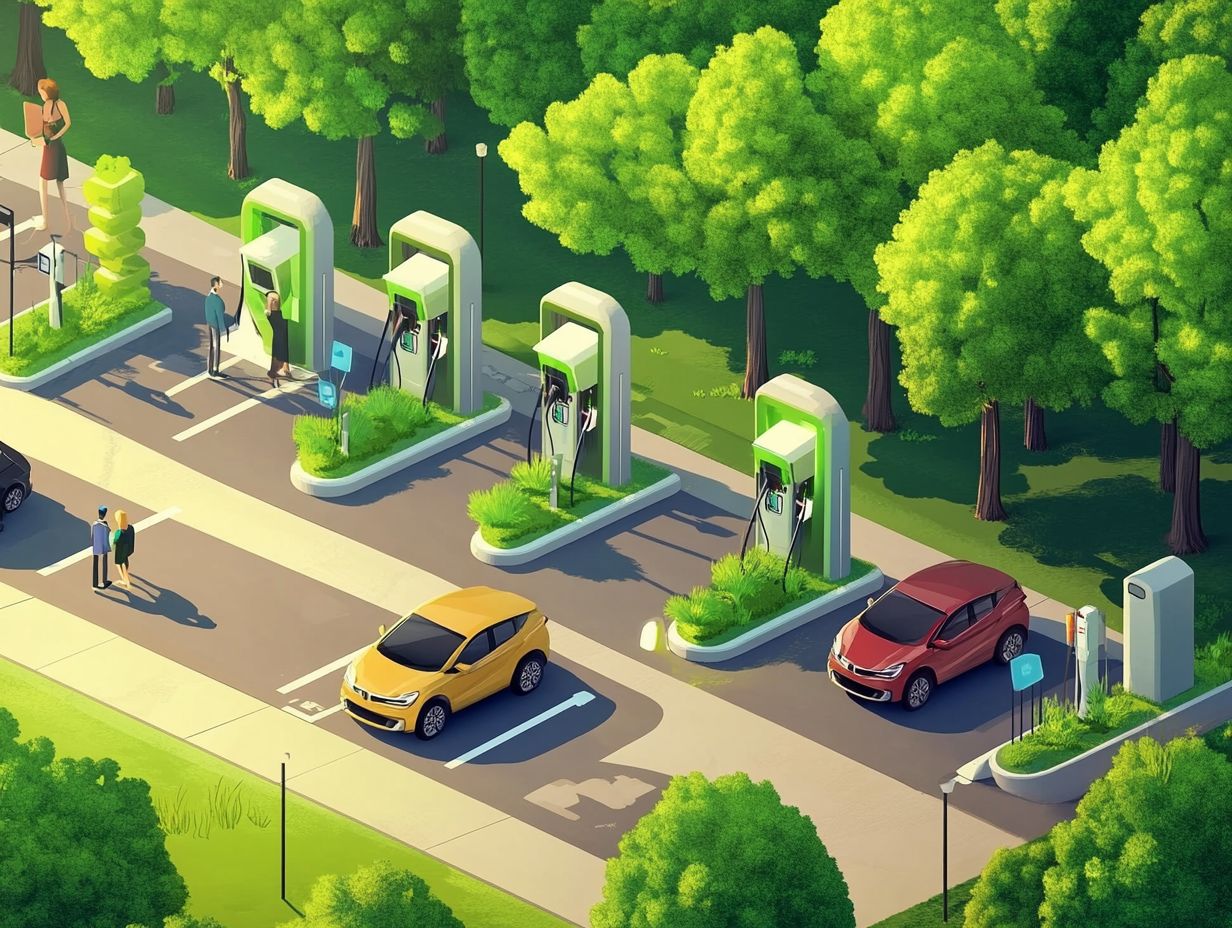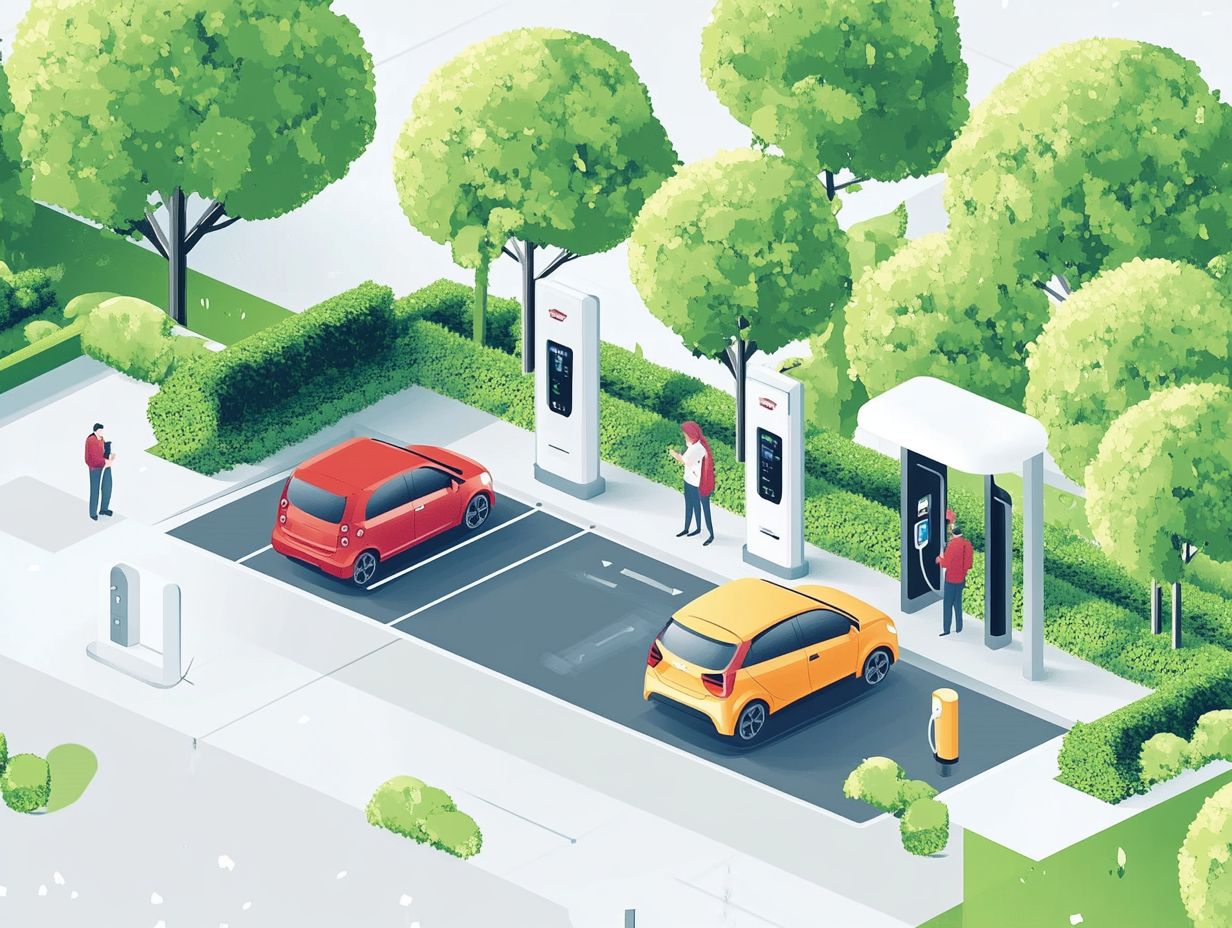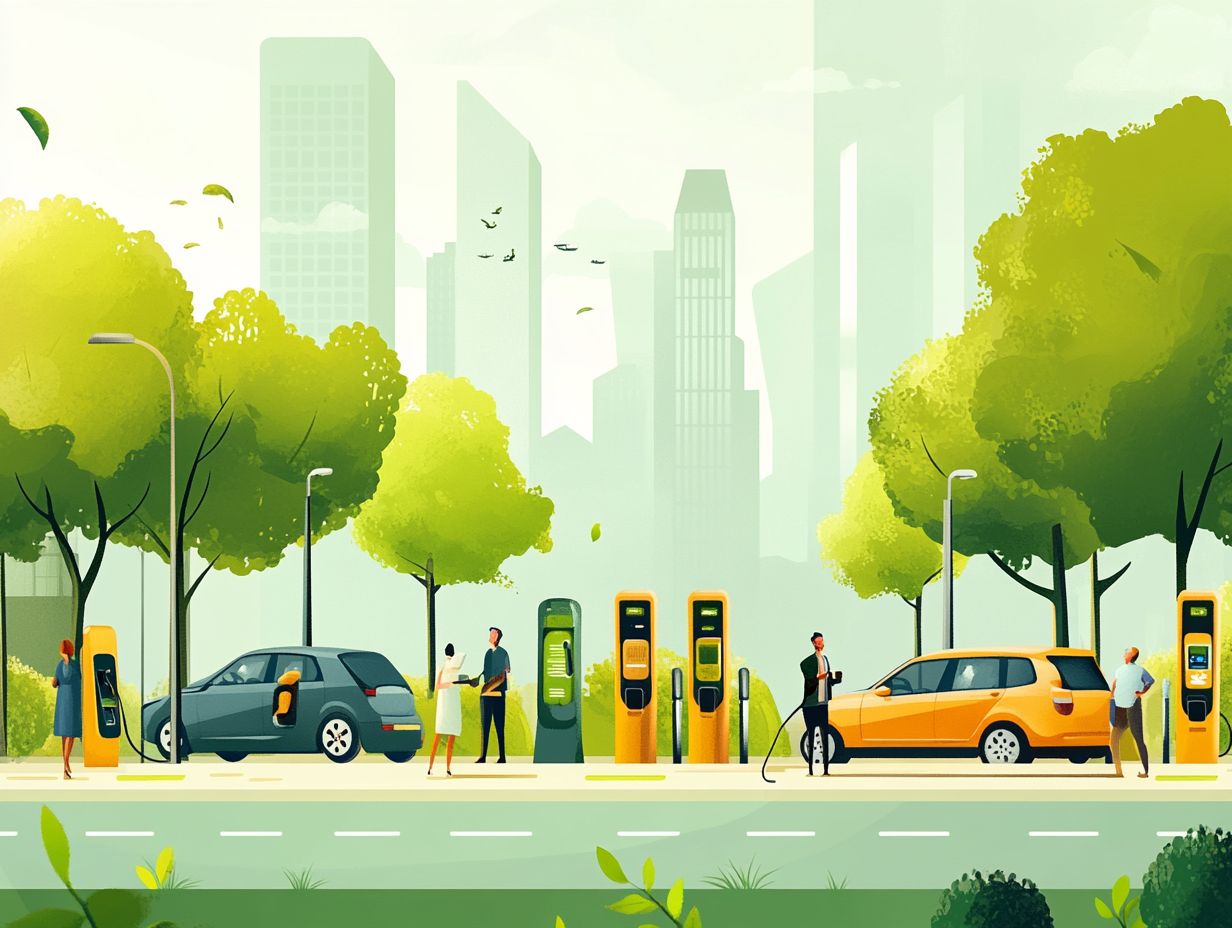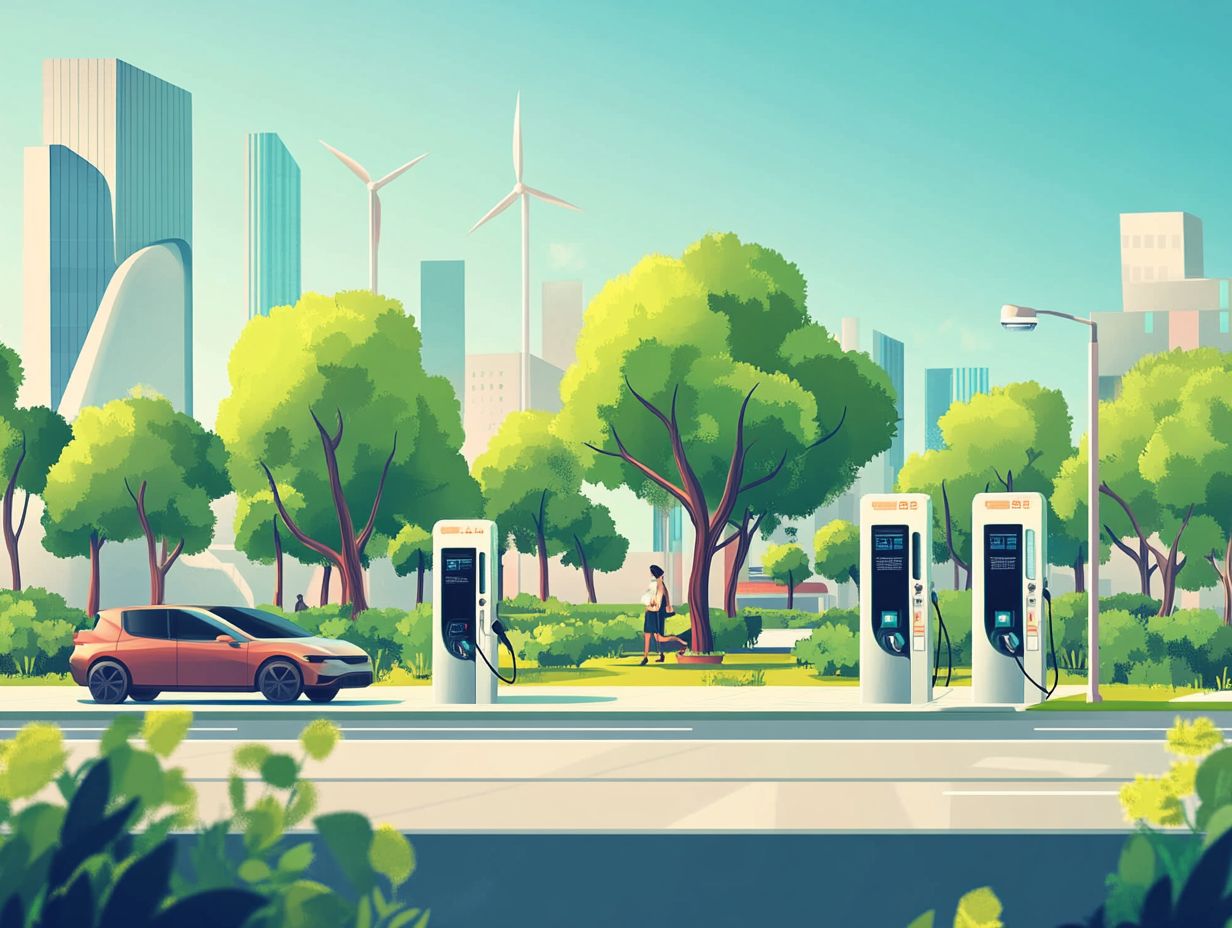The Environmental Impact of EV Charging Stations
As electric vehicles (EVs) gain momentum in your pursuit of sustainable transportation, the importance of EV charging stations becomes ever more pronounced. Join the movement towards greener transportation! Electric vehicles and their charging stations are changing the game for a sustainable future.
This article delves into their environmental impact, illustrating how they can significantly reduce carbon emissions, enhance air quality, and affect your energy grid. It also addresses practical solutions for mitigating any potential drawbacks, such as incorporating renewable energy sources and advancing infrastructure.
You ll also discover predictions regarding the growth and innovations in EV charging technology. Together, let s explore the critical intersections between eco-friendliness and electric mobility.
Contents
- Key Takeaways:
- What are EV Charging Stations?
- Environmental Impact of EV Charging Stations
- Solutions to Minimize Environmental Impact
- Future Outlook for EV Charging Stations
- Frequently Asked Questions
- What is the environmental impact of EV charging stations?
- Do EV charging stations use renewable energy?
- How do EV charging stations reduce carbon emissions?
- Are there any negative environmental impacts of EV charging stations?
- Do EV charging stations contribute to air pollution?
- How can EV charging stations help reduce dependence on fossil fuels?
Key Takeaways:

- EV charging stations play a significant role in reducing carbon emissions and improving air quality by promoting the adoption of electric vehicles.
- The impact of EV charging stations on the energy grid can be minimized by utilizing renewable energy sources and improving charging station infrastructure.
- With the predicted growth and advancements in EV charging stations, there is a promising future for a more sustainable transportation system.
What are EV Charging Stations?
EV Charging Stations are designed to meet the power needs of electric vehicles (EVs). They ensure that recharging these vehicles is efficient and convenient. These stations play a crucial role in the network of stations and equipment that provides power to electric vehicles, which is vital for the growing use of these greener transportation options.
By utilizing these stations, you can effortlessly power your electric vehicle and lessen your dependence on fossil fuels. As electric vehicle technology advances, the proliferation of accessible and user-friendly charging stations becomes increasingly essential. This enhances the appeal of electric vehicles as a mainstream choice for those who prioritize environmental sustainability and the reduction of greenhouse gas emissions.
Environmental Impact of EV Charging Stations
The environmental impact of EV charging stations is exciting! They play a key role in fighting climate change and reducing greenhouse gas emissions. While electric vehicles generate zero tailpipe emissions, understanding the environmental impact of EV charging is crucial, as the electricity sourced at charging stations can either exacerbate or alleviate carbon emissions, depending on the energy mix of the local power grid.
Integrating renewable energy sources into the charging infrastructure can substantially boost the sustainability of electric vehicle usage. This ultimately lowers the overall carbon footprint tied to transportation.
Reducing Carbon Emissions
Reducing carbon emissions is a crucial goal as you transition to electric vehicles, which promise cleaner transportation solutions compared to traditional gasoline-powered cars. By using EV charging stations powered by renewable energy sources like wind and solar, you can significantly reduce the overall carbon emissions associated with vehicle lifetimes. For more insights, explore the impact of EV charging on home energy use, as this plays a vital role in achieving broader emission reduction goals in the fight against climate change.
The widespread adoption of electric vehicles not only improves air quality but also promotes energy independence by reducing reliance on fossil fuels. By investing in infrastructure that supports the integration of renewable energy into the grid, you contribute to creating a robust system where electric vehicles are charged with clean energy. This harmonious relationship enhances environmental benefits by minimizing pollution from conventional energy sources.
In this way, your transition to electric transportation becomes an essential step toward sustainability, paving the way for healthier urban environments and a more sustainable future.
Impact on Air Quality

Electric vehicles (EVs) can transform air quality, especially in cities where traditional cars create pollution. By switching to EVs, you can greatly enhance air quality and reduce harmful emissions.
This change leads to fewer respiratory issues and cardiovascular diseases linked to dirty air. Research shows that lowering pollutants can mean fewer hospital visits and lower healthcare costs benefits for you and your community.
As more people adopt EVs, cleaner air becomes a reality, resulting in healthier environments for everyone. This shift enriches your life and supports a sustainable future.
Effects on Energy Grid
The rise of electric vehicles is significantly affecting the energy grid. This shift requires robust charging stations and highlights the impact of charging infrastructure on EV adoption, posing both opportunities and challenges for power plants and grid operators.
As EV use grows, grid managers must balance the greater demand during peak charging times and integrate renewable energy. Innovative solutions, like encouraging charging during off-peak hours, can help ease this burden.
Investing in charging infrastructure not only supports your transition to EVs but also strengthens the power system’s resilience to future energy needs.
Solutions to Minimize Environmental Impact
Finding ways to lessen the environmental effects of EV adoption is crucial for sustainable transportation. Integrating renewable energy sources at charging stations aligns with the importance of sustainable EV charging solutions, helping to cut carbon emissions and boost EV benefits.
Advocating for policies that promote eco-friendly charging stations and continuously evaluating their impact is essential in understanding the role of EV charging in reducing emissions.
Implementing Renewable Energy Sources
Using renewable energy for your charging stations is key to improving the sustainability of electric vehicle usage. By using solar or wind energy, your stations can lower their carbon footprint and support a cleaner energy mix.
This change reduces emissions from traditional power plants and aligns with the goal of cutting greenhouse gases. It also helps you manage operational costs and can even allow you to sell surplus energy back to the grid.
Embracing renewable energy fosters innovation and encourages a shift towards sustainable living. A diverse energy mix enhances the reliability and efficiency of your EV infrastructure, promoting wider adoption and reducing environmental impact.
Improving Charging Station Infrastructure

Improving charging station infrastructure is absolutely vital to meet the surging demand for electric vehicles (EVs) and help make the shift to sustainable transportation easier. You can enhance this experience by:
- Increasing the number and accessibility of charging stations
- Investing in faster charging technologies
- Ensuring that the infrastructure seamlessly integrates into technology that helps manage energy use for optimal energy management
A comprehensive charging network not only boosts EV range accessibility but also builds confidence in the adoption of electric vehicles.
As electric vehicle adoption continues to climb, it’s crucial to ensure that charging stations are conveniently located in urban areas and along highways. Accessibility is key; it alleviates the fear of running out of battery while driving for potential EV owners. By incorporating advanced technologies like mobile apps and contactless payment options, you can streamline the overall charging experience.
Integrating these stations with renewable energy sources, such as solar or wind power, supports a cleaner energy grid. This allows you to charge your vehicle using sustainable energy, aligning perfectly with broader environmental goals.
Future Outlook for EV Charging Stations
The future of EV charging stations presents an exciting opportunity, as rapid advancements in technology and infrastructure are set to dramatically transform the electric vehicle landscape. With the growing demand for electric vehicles, you can expect innovations in charging technology and more investments in charging infrastructure to flourish.
This dedicated emphasis on sustainable transportation will facilitate the expansion of charging stations in both urban and rural settings. Such evolution is crucial for enabling electric vehicles to realize their full potential in minimizing greenhouse gas emissions and fostering a cleaner environment.
Predicted Growth and Advancements
The anticipated growth in EV charging stations and advancements in charging technology are poised to transform the electric vehicle landscape. As electric vehicle adoption accelerates, it’s clear that the demand for fast and efficient charging solutions will surge. This will inevitably spark significant innovations in battery technology and charging infrastructure, crucial for facilitating the shift to sustainable transportation and meeting emission reduction targets.
As the market adapts to evolving consumer expectations, major players are heavily investing in next-generation technology that promises quicker charging times and improved accessibility. Analysts predict that public-private partnerships will be instrumental in expanding the network of charging locations, catering to an increasingly diverse range of EV users.
Smart charging solutions are likely to elevate the user experience by providing real-time monitoring and scheduling capabilities, effectively alleviating the range anxiety often associated with electric vehicles. Together, these technological advancements and market responsiveness signal a pivotal shift in consumer behavior, giving the power to more individuals to confidently embrace eco-friendly transportation alternatives.
Frequently Asked Questions
What is the environmental impact of EV charging stations?

The environmental impact of EV charging stations is largely positive, as they provide a cleaner and more sustainable source of energy for electric vehicles compared to traditional gasoline-powered vehicles. However, it’s important to consider the environmental impact of EV manufacturing as well.
Do EV charging stations use renewable energy?
Some EV charging stations do use renewable energy, such as solar or wind power, but it ultimately depends on the source of the electricity that powers the station.
How do EV charging stations reduce carbon emissions?
EV charging stations reduce carbon emissions by eliminating the need for gasoline, which is a major contributor to greenhouse gases. They also have the potential to use renewable energy, further reducing carbon emissions.
Are there any negative environmental impacts of EV charging stations?
EV charging stations are mostly beneficial, and understanding the role of charging stations in EV ecosystems can help maximize their positive impact. However, we must consider the environmental effects of producing and disposing of electric car batteries.
Do EV charging stations contribute to air pollution?
Generally, EV charging stations do not pollute the air during use. Still, if the electricity powering them comes from fossil fuels, it can indirectly lead to air pollution. However, with innovations like solar-powered EV charging stations, we can further reduce this impact.
How can EV charging stations help reduce dependence on fossil fuels?
By providing a cleaner transportation option, EV charging stations decrease our reliance on gasoline. This shift can significantly lower the demand for fossil fuels and their harmful environmental impact, as detailed in the future of EV charging stations explained.




